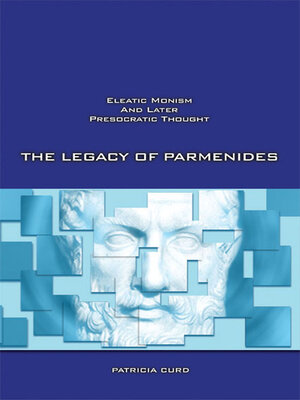
Sign up to save your library
With an OverDrive account, you can save your favorite libraries for at-a-glance information about availability. Find out more about OverDrive accounts.
Find this title in Libby, the library reading app by OverDrive.



Search for a digital library with this title
Title found at these libraries:
| Loading... |
Parmenides of Elea was the most important and influential philosopher before Plato. Patricia Curd here reinterprets Parmenides' views and offers a new account of his relation to his predecessors and successors.
In the traditional interpretation, Parmenides argues that generation, destruction, and change are unreal and that only one thing exists. He therefore rejected as impossible the scientific inquiry practiced by the earlier Presocratic philosophers. But the philosophers who came after Parmenides attempted to explain natural change and they assumed the reality of a plurality of basic entities. Thus, on the traditional interpretation, the later Presocratics either ignored or contradicted his arguments. In this book, Patricia Curd argues that Parmenides sought to reform rather than to reject scientific inquiry and offers a more coherent account of his influence on the philosophers who cameafter him.
The Legacy of Parmenides provides a detailed examination of Parmenides' arguments, considering his connection to earlier Greek thought and how his account of "what-is" could serve as model for later philosophers. It then considers the theories of those who came after him, including the Pluralists (Anaxagoras and Empedocles), the Atomists (Leucippus and Democritus), the later Eleatics (Zeno and Melissus), and the later Presocratics (Philolaus of Croton and Diogenes of Apollonia). The book closes with a discussion of the importance of Parmenides' views for the development of Plato's Theory of Forms.
This first-time in paperback edition includes a new Introduction by the author in which she clarifies her position on the following points: Monism, Internal and External Negations, Locomotion and the Specification of How What-is Is, and Doxa. Also added is a Supplementary Bibliography. (The Legacy of Parmenides was first published in hardcover in 1997 by Princeton University Press).






